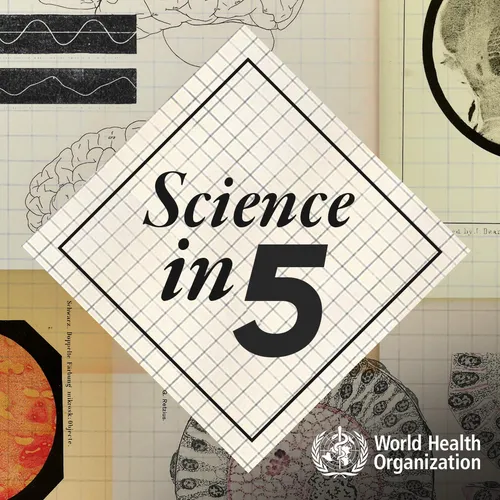
Science in 5
Science in 5 is WHO’s conversations in science. Listen to WHO experts explaining science related to COVID-19.
- Update frequency
- every 13 days
- Average duration
- 5 minutes
- Episodes
- 143
- Years Active
- 2020 - 2025

COVID-19: Pregnancy & COVID-19
What advice does WHO have for women who are pregnant or are planning pregnancy during the pandemic? What should a woman expect for her care during childbirth and pregnancy at this time? What if a wom…

COVID-19: vaccines and children
Why does WHO recommend at this time, in June 2021, that vaccinating children is not a priority? When would their vaccination be prioritized? How is safety of these vaccines ensured? WHO’s Chief Scie…

COVID-19: vaccines, pregnancy, menstruation, breastfeeding and fertility
What is the guidance for vaccination of women with breastfeeding infants, women who are pregnant or planning to get pregnant and women who are menstruating? What about vaccines and fertility? WHO’s D…

COVID-19: Transmission indoors and outdoors
How does SARS-CoV-2 , the virus that causes COVID-19 , spread from one person to another? How can you keep yourself safe indoors and outdoors? WHO’s Dr Oliver Morgan explains in Science in 5.

COVID-19 : Update on virus variants
What are the variants circulating at this time? How are variants classified as variants of interest or concern? What does this mean for the public? Dr Maria Van Kerkhove explains in Science in 5 this…

COVID-19: Current Global trends
What is data telling us about the spread of COVID-19 around the world? What does evidence tell us about transmission in populations that are vaccinated? WHO’s Dr Oliver Morgan explains in Science in …

COVID-19 : Treatment and care at home
If you have COVID-19 and are caring for someone or yourself at home, what is the treatment protocol? What is WHO’s guidance on Remdesivir and convalescent plasma therapy? How to monitor oxygen at hom…

COVID-19: safe care at home
If you are caring for yourself or a loved one at home, how can you keep everyone safe? Who should be cared for at home? How to prevent COVID-19 infection to other family members? What red flags shoul…

COVID-19 : Which vaccine should I take and what about side effects?
If you have the choice of more than one vaccine and are wondering which one to take and how to assess the risk of side effects, this episode of Science in 5 with WHO’s Dr Katherine O’Brien is for you…

COVID-19: Vaccines, variants and mass gatherings
How much protection does the current batch of COVID-19 vaccines provide us? Would you need a booster shot for new variants? What do science and evidence tell us about mass gatherings and the spread o…

COVID-19: Medical oxygen
Medical oxygen is an essential medicine in the treatment of COVID-19. How is it used? Why is there a shortage in some countries and what are WHO, partners and Governments doing about it? WHO’s Dr Jan…

COVID-19: Equity in vaccines, treatment and tests
In our unequal world, how is inequity impacting our fight against COVID-19? How can we address it? WHO’s Dr Mariângela Simao explains in Science in 5 this week.

COVID-19 - vaccines, variants & doses
If you have already had COVID-19 do you still need both doses of the vaccine? Do these vaccines protect you against infection? Do they protect us against variants? WHO’s Dr Katherine O’Brien answers …

COVID-19: vaccines- when and why?
If you have been wondering when you would receive your vaccine, why you should get vaccinated and are concerned about what your are hearing about side effects, this episode of Science with 5 with WHO…

COVID-19 - Developing WHO’s public health advice
In this week’s episode, WHO’s Dr. John Grove explains how the World Health Organization brings the best evidence together to develop health guidance for the world.

COVID-19: Evolution of the SARS-CoV-2 virus
What is the latest information on the SARS-CoV-2 virus variants? How is WHO tracking these virus mutations globally and how do we know which ones are important? Answering these questions in this epis…

COVID-19: Vaccines, variants & herd immunity
As new variants emerge people are wondering if they should wait until a more efficacious vaccine is available or if they should go ahead and get vaccinated now? Answering your questions on COVID-19 v…

COVID-19: Vaccine dosage
How far apart should the doses of vaccines be? What if I miss my second dose? Can I get two doses from two different manufacturers? How was safety of vaccines ensured? WHO’s Chief Scientist, Dr Soumy…

COVID-19 - Vaccines explained
If you have had COVID-19, should you still get vaccinated ? Why are we not vaccinating children under 16? WHO’s Chief Scientist Dr Soumya Swaminathan explains these and other vaccine related question…

COVID-19 - Vaccine myths vs Science
WHO expert Dr Katherine O’Brien busts some vaccine myths related to infertility, DNA and composition of vaccines in this week’s Science in 5.